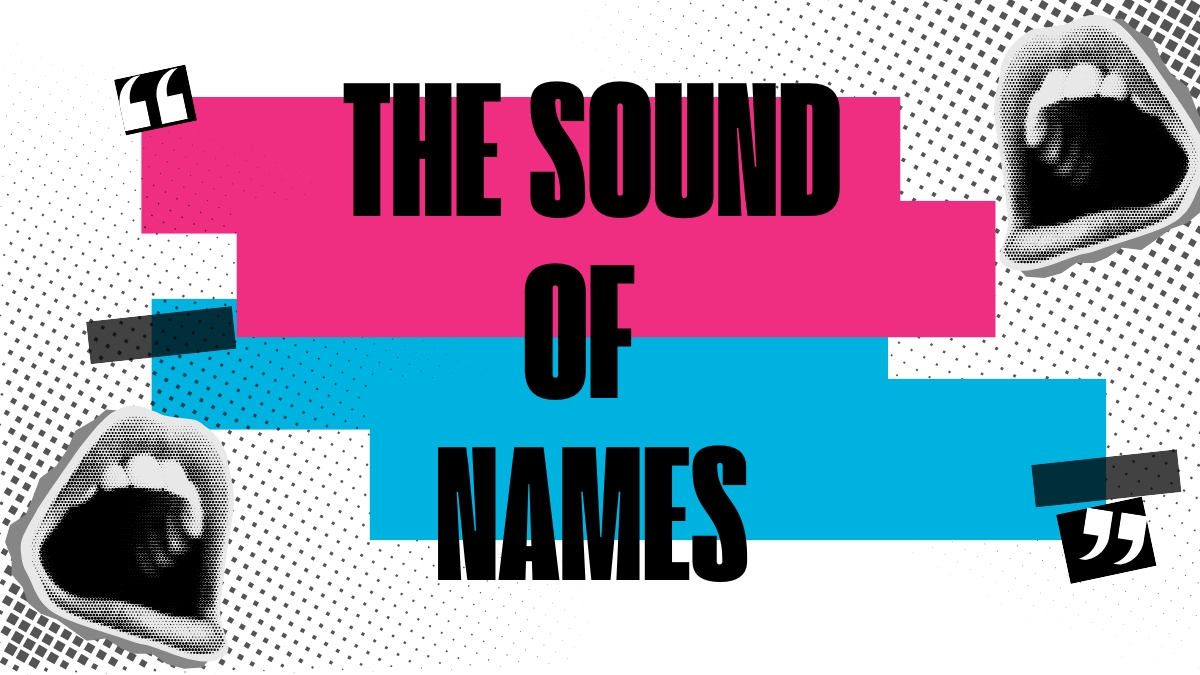Introduction
Names serve a purpose beyond being simply labels, they represent experiences. A name’s sound qualities can show feelings or shape, and affect how we view the individual or identity it represents. Whether it’s the rhythm of Seraphina or the striking impact of Max, a name’s sound shows significance. But what causes some names to sing while others scream?
Phonetics as a Science
The study of the physical sounds of human speech is called phonetics, and it is essential to our perception of names. Every name is fundamentally based on sound. The phonetics determines how a name feels when pronounced, whether it is smooth or sharp.
Vowels vs. Consonants
The melodic names are built around vowels. These sounds are open and flowing, conveying a sense of softness and fluidity. Names such as Lila, Elena, and Amara contain many vowels, contributing to their gentle and peace-like quality. Consonants can provide a name with structure and texture; however, an excess of hard consonants (such as k, t, or g) may create a name abrupt or harsh. Monikers such as Gretchen, Brick, or Kirk frequently belong to this group.
The Role of Syllables and Rhythm
The rhythm of a name, its syllable arrangement and emphasis can determine whether it has a melodic quality or is irritating.
Patterns of Syllables
Names where stressed and unstressed syllables alternate often seem more melodic. As an example, the name Olivia (o-LIV-ee-uh) has a natural rhythm that makes it sound pleasant. On the other hand, names that have uneven stress patterns, such as Beatrice (BEE-uh-tris), may seem less fluid.
The Enchantment of Three Syllables
Names with three syllables often find the ideal equilibrium between simplicity and complexity. Names such as Eleanor, Sebastian, and Gabriella possess a natural rhythm that renders them both sophisticated and inviting.
The Impact of Ending Sounds
A name’s sound can also be influenced by how it ends. Names concluding with a vowel or soft consonant (e.g., Noah, Sophia) tend to sound more melodic, whereas names ending with a hard consonant (e.g., Brett, Margaret) can come across as more abrupt.
What Forms a “Beautiful” Name?
Euphony’s Function
Euphony indicates the acceptable quality of sound. Names considered beautiful often have certain phonetic characteristics in common:
Soft consonants: The sounds of L, M, and N produce a mild, flowing effect (e.g., Lila, Emmett).
Open vowels: Vowels such as A, E, and O provide warmth and resonance (e.g., Amara, Eloise).
Balanced syllables: Names that have a harmonious rhythm, like Olivia or Sebastian, sound musical and are satisfying to pronounce.
Conversely, names that feature harsh consonants (such as K, T, or G) or abrupt endings (like Brett or Gertrude) may seem less melodious.
Sound Preferences across Cultures
Various cultures have unique preferences regarding the sound of names. As an illustration:
Japanese names frequently conclude with vowels, resulting in a gentle, flowing sound (e.g., Sakura, Haruto).
Many African names include rhythmic and repetitive sounds, such as Kofi and Amina.
Hard consonants and strong syllables are often emphasized in Germanic names (e.g., Gunther, Brunhilde).
These preferences are signs of deeper cultural values and language structures. For example, the gentle qualities of Japanese names correspond to the language’s focus on harmony and respect, whereas the robust nature of Germanic names reflects the culture’s historical emphasis on strength and resilience.
The Emotional Effects of Sounds
Particular sounds call to mind certain feelings or connections:
Sounds like “S” or “Sh” (e.g., Sasha, Shiloh) have a whispery and enigmatic quality.
Sounds like “K” or “T” (e.g., Kai, Tate) are perceived as sharp and powerful.
Long vowels (like in Elena, Noah) have a warm and welcoming quality.
These unconscious links affect our perception of individuals according to their names. A name like Luna, for instance, could conjure feelings of beauty and tranquility, whereas a name like Rex might feel authoritative and daring.
The Rhythm of Names
The Impact of Syllables
The arrangement and quantity of syllables in a name can have a significant impact on its rhythm:
Names with one syllable (like Grace, Jack) come across as direct and vigorous.
Multi-syllabic names (e.g., Alexander, Elizabeth) have a grand and royal feel.
Names that feature alternating stressed and unstressed syllables (such as Olivia, Sebastian) often have a musical quality and are pleasing.
Names that have syllable patterns which are uncomfortable (like Beatrice with its jarring “trice” ending) may come across as less fluid and more difficult to recall.
How Combination and Repetition Function
Names that feature combination (like Peter Parker, Lois Lane) or repetition (such as Anna, Lulu) tend to be catchy and easy to remember. These patterns instill a feeling of unity and rhythm, causing the name to linger in our memories.
The name Marilyn Monroe serves as an example of something iconic, not only due to the individual it denotes but also because of its musical and vocal characteristics.
The Cultural Sound
Names Serving as Indicators of Culture
Names often hold cultural importance, mirroring the values, history, and language of a community. As an illustration:
Names from Hawaii, such as Kai (which translates to “sea”) or Leilani (which translates to “heavenly flowers”), bring to mind the islands’ natural beauty.
Sanskrit names such as Aarav (which means “peaceful”) or Anika (which means “grace”) embody the spiritual and philosophical traditions of India.
These names serve not only as labels but also as cultural artifacts that tell the story of those who carry them.
The Globalization of Personal Names
With the increasing interconnection of the world, names from various cultures are merging. As an illustration:
Due to its lyrical quality, the name Aria (which means “air” or “song” in Italian) has gained popularity in countries where English is spoken.
Names such as Kai (which means “sea” in Hawaiian) or Sienna (which refers to a reddish-brown color in Italian) are now globally acknowledged.
This combination of naming customs mirrors the growing diversity of our world, yet it prompts questions regarding cultural appropriation and identity.
The Science of Sound Symbolism:
The Reason Some Sounds Seem to “Fit” Universal Sound-Meaning Connections
Studies indicate that particular sounds are universally linked to specific characteristics:
Vowels produced at the front of the mouth and high in the vocal tract (such as the “ee” in Lily) are frequently linked to notions of lightness or smallness.
Vowels articulated in the lower back of the mouth (e.g. “o” in Otto) are frequently linked to bigness or weightiness.
These universal sound-meaning associations affect our perception of names. A name such as Tinkerbell, for instance, seems light and delicate, whereas a name like Bruno appears strong and solid.
Emotional and Psychological Associations
The way we perceive the sound of a name is frequently influenced by the feelings and recollections we connect to it.
Individual Experiences
If you’ve encountered a kind and gentle Emily, the name may forever embody feelings of warmth and sweetness. On the other hand, if you’ve had a bad experience with someone named Todd, the name may seem harsh or unpleasant to you, no matter how it sounds.
Famous Figures
The names linked to cherished characters, be they actual or imaginary, frequently acquire a lyrical quality. For instance, due to the Harry Potter series, the name Hermione has come to be associated with intelligence and bravery. Conversely, names associated with villains or negative figures, such as Voldemort or Umbridge, may come across as irritating or disturbing.
The Art of Naming
It is both a science and an art to choose a name that sings rather than screeches. Here are several suggestions for discovering the ideal name:
Sound Experimentation
Tweak the mix of consonants and vowels until you find a combination that sounds nice. For instance, the names Amara and Elias demonstrate a balanced blend of softness and structure.
Say It Out Loud
A name might appear beautiful when written, but pronouncing it can expose its actual sound. Consider how the name feels when pronounced and how it flows with the surname.
Take the Rhythm into Account
Search for names that have a natural rhythm and balanced stress patterns. Names such as Isabella and Sebastian possess a melodic quality that imparts an air of elegance and timelessness.
Case Studies: Names That Sing vs. Names That Screech
We will examine some examples of names that sing and names that screech, analyzing what causes them to belong to their respective categories.
Names That Resonate
Aria: This name has a melodic quality, thanks to its gentle a and r sounds.
Julian: The j and l sounds, which flow into one another, lend this name a lyrical quality.
Seraphina: This name has an angelic feel due to the combination of the s, f, and n sounds.
Names That Screech
Gertrude: The hard g and t consonants make this name sound severe and disturbing.
Balthazar: The group of consonants in this name can seem daunting.
Agatha: The hard g and t sounds make this name sound harsh.
The Future of Name Sounds: What Lies Ahead?
The Rise of Distinctive and Nontraditional Names
Names that have unusual or nontraditional phonetic qualities are becoming more appealing to contemporary parents. As an illustration:
Names such as Zephyr (which means “west wind”) or Aurelia (which means “golden”) are becoming more popular.
Some parents are crafting entirely new names by mixing sounds from various languages or cultures.
This tendency mirrors a wish for uniqueness and creativity in names.
The Hidden Harmonies: Fascinating Facts About the Sound of Names
The Bouba-Kiki effect
In a well-known psychological experiment, volunteers were shown two shapes. One with spikes and one rounded. And asked them to match the names “Bouba” and “Kiki” to them. More than 95% of individuals identified the rounded shape as “Bouba” and the spiky shape as “Kiki.”
Sound symbolism is a phenomenon that demonstrates the universal association of certain sounds with specific shapes and traits. For instance, rounded vowels (such as “oo” in Bouba) are perceived as soft and smooth, whereas sharp consonants (like “k” in Kiki) feel harsh and angular.
Implication for Names: Names that feature rounded sounds (like Lola or Milo) may come across as friendlier, whereas names with sharp sounds (such as Kat or Zack) may seem more intense.
The Link Between Size and Sound
Studies demonstrate that individuals link specific sounds with size. As an illustration:
High-front vowels (such as “ee” in Tiny) are associated with smallness.
Vowels with a low tongue position (such as the “o” in Hulk) are associated with bigness.
That is the reason names such as Leo or Max seem robust and substantial, whereas names like Lily or Mia come across as gentle and small.
The “Age-Sound” Bias
Sounds can affect the perception of a name’s age. As an illustration:
Names that have a gentle, musical quality (such as Ella and Noah) are frequently regarded as youthful.
Names that have impacting, interrupted sounds (such as Harold or Gertrude) are frequently seen as antiquated.
This bias can influence the rise and fall in names’ popularity over time.
The “Maluma-Takete” Effect
Like the Bouba-Kiki Effect, the Maluma-Takete Effect shows how individuals link particular sounds to distinct shapes.
Maluma is reliably associated with rounded, gentle forms.
Takete is associated with sharp, angular forms.
This phenomenon demonstrates that sound-shape associations are deeply embedded in human intellect, overpassing language and culture.
The Sound of Names in Different Languages
Comparing the phonetic qualities of names across various languages and what this indicates about cultural values. As an illustration:
Names in Japanese such as Sakura (cherry blossom) highlight beauty and harmony.
Arabic names such as Zahra (meaning flower) highlight sophistication and charm.
Conclusion: The Symphony of Names
Names go beyond simple words, they contain a harmonious blend of sounds, meanings, and emotions. Some names have a musical quality, their tunes echoing in our thoughts like a beloved tune. Others scream, their tones discordant and grating. Regardless of whether a name sings or screeches, it brings with it a story, history, and sense of identity. A name’s beauty ultimately derives from its sound and the way it resonates with us. The next time a name is mentioned, pay close attention. Is it a tune or a screech? And what does it indicate about the individual who has it?
However, for some individuals, the story extends beyond the name they were given.It is, in fact, just the beginning. Ranging from explosive works to names so unusual they resemble jokes, a number of people have ventured into the realm of naming in ways that are genuinely surprising. Let’s delve into The Most Bizarre and Hilarious Name Changes Ever and you’ll be astonished at what people are calling themselves!




